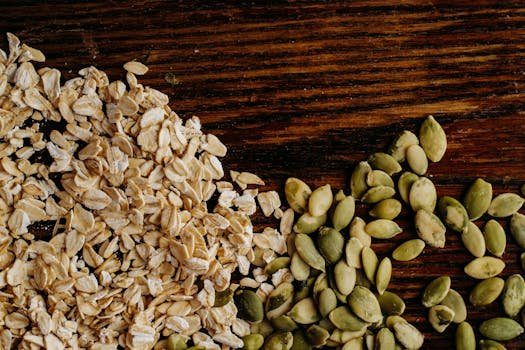Oat Flour vs. Coconut Flour: A Comprehensive Nutritional Comparison
Choosing the right flour can significantly impact your health and dietary needs. This comprehensive guide, brought to you by Dr. Sumaiya’s NutriCare Clinic, provides an in-depth, evidence-based comparison of oat flour and low-fat (10%) coconut flour. We’ll explore their nutritional profiles, health benefits, culinary uses, and help you make an informed decision to support your wellness journey. We will also provide actionable tips and insights, backed by scientific research, to help you integrate these flours into your diet effectively.
Table of Contents
- Macronutrient Comparison
- Glycemic Index & Impact on Blood Sugar
- Micronutrient Content
- Health Benefits
- Culinary Uses
- Choosing the Right Flour for Your Needs
- Interested in Personalized Nutrition?
- Frequently Asked Questions
- References
1. Macronutrient Comparison
Understanding the macronutrient breakdown of oat flour and coconut flour is essential for aligning your food choices with your dietary goals. Whether your focus is weight management, muscle building, or managing blood sugar, knowing the macronutrient content is crucial. Here’s a comparison per 100 grams:
| Macronutrient | Oat Flour | Coconut Flour (10% Fat) |
|---|---|---|
| Calories | ~400 kcal | ~300 kcal |
| Carbohydrates | ~65g | ~30g |
| Protein | ~13g | ~8g |
| Fat | ~7g | ~10g |
| Fiber | ~10g | ~40g |
- Calories: Coconut flour is lower in calories, making it a suitable option for those on calorie-restricted diets or aiming for weight loss.
- Carbohydrates: Oat flour has significantly more carbohydrates, providing sustained energy. This makes it ideal for athletes or active individuals. Coconut flour, with its lower carbohydrate content, is better suited for low-carb diets like ketogenic (keto) or paleo diets.
- Protein: Oat flour contains more protein, which is beneficial for muscle repair, growth, and overall satiety.
- Fat: Coconut flour has a slightly higher fat content, primarily healthy saturated fats. Oat flour contains mostly heart-healthy unsaturated fats.
- Fiber: Coconut flour is exceptionally high in fiber, promoting digestive health, satiety (feeling full), and blood sugar control.
2. Glycemic Index & Impact on Blood Sugar
The glycemic index (GI) measures how quickly a food raises blood sugar levels. This is particularly crucial for individuals with diabetes, prediabetes, or those monitoring their blood glucose. A lower GI indicates a slower, more gradual rise in blood sugar.
Oat Flour: Has a moderate glycemic index (around 50-60). The fiber content helps moderate the blood sugar response, leading to a steady release of energy and preventing sharp spikes.
Coconut Flour: Has a low glycemic index (around 50). The high fiber content significantly slows down glucose absorption, minimizing blood sugar spikes. This makes it an excellent choice for managing blood sugar levels and is suitable for individuals with diabetes.
3. Micronutrient Content
Both flours offer distinct micronutrient profiles, contributing to various aspects of health:
Oat Flour: A good source of iron (crucial for red blood cell production and preventing anemia), magnesium (supports muscle and nerve function, blood sugar control, and blood pressure regulation), and B vitamins (essential for energy metabolism and nerve function). Oatmeal, made from oats, is a particularly rich source of these vitamins and minerals.
Coconut Flour: Rich in manganese (important for bone health, metabolism, and antioxidant function), and also contains potassium (supports healthy blood pressure) and iron.
4. Health Benefits
Each flour offers distinct health advantages:
Oat Flour
- Heart Health: Contains beta-glucan, a soluble fiber proven to lower cholesterol levels, reducing the risk of cardiovascular disease (Source: NIH).
- Weight Management: The fiber promotes satiety, helping you feel fuller for longer and potentially reducing overall calorie intake, aiding in weight management.
- Sustained Energy: The complex carbohydrates provide a sustained release of energy, making it ideal for athletes or individuals with active lifestyles.
- Digestive Health: The fiber content supports regular bowel movements and overall gut health by promoting a healthy gut microbiome.
Coconut Flour
- Gut Health: The exceptionally high fiber content promotes healthy digestion and can help prevent constipation. It also acts as a prebiotic, feeding beneficial gut bacteria, which is crucial for overall health.
- Low-Carb Diet Friendly: Suitable for ketogenic, low-carb, and paleo diets due to its low net carbohydrate content.
- Blood Sugar Management: The low GI and high fiber content contribute to stable blood sugar levels, making it beneficial for individuals with diabetes or insulin resistance.
- Gluten-Free: A naturally gluten-free option, suitable for individuals with celiac disease or gluten sensitivity.
5. Culinary Uses
Both flours have distinct textures and properties that influence their use in cooking and baking:
Oat Flour
- Baking: Works well in bread, muffins, cookies, pancakes, and other baked goods. It adds a slightly nutty flavor and a tender, moist crumb.
- Thickening Agent: Can be used to thicken soups, stews, and sauces.
- Smoothies: Add to smoothies for extra fiber, nutrients, and a creamier texture.
Coconut Flour
- Gluten-Free Baking: Ideal for gluten-free bread, cakes, and muffins. It’s very absorbent, so it requires more liquid and eggs in recipes. Start by substituting 1/4 to 1/3 cup of coconut flour for every 1 cup of wheat flour, and increase the number of eggs.
- Low-Carb Baking: Used in keto and low-carb recipes to replace traditional flours.
- Coating: Can be used as a breading or coating for chicken, fish, or vegetables.
- Thickening Agent: Can also be used in small amounts to thicken sauces or gravies.
6. Choosing the Right Flour for Your Needs
The best flour for you depends on your individual dietary goals, health needs, and preferences:
- Choose Oat Flour if: You need sustained energy, are looking for a good source of protein and iron, want a versatile flour for baking, and don’t have gluten sensitivities.
- Choose Coconut Flour if: You’re following a low-carb or gluten-free diet, need to increase your fiber intake, want to manage your blood sugar levels, or are looking for a grain-free alternative.
It’s also possible to blend oat and coconut flour in recipes to reap some benefits from both!
7. Interested in Personalized Nutrition?
To determine the best flour option and create a personalized dietary plan tailored to your specific health needs and goals, consider a consultation with Dr. Sumaiya’s NutriCare Clinic. Our expert guidance can help you optimize your nutrition for improved health and well-being. A registered dietitian can provide personalized recommendations based on your individual needs and health status.
8. Frequently Asked Questions
- Which flour type aligns best with your dietary goals (e.g., weight management, blood sugar control)? We encourage you to share your dietary goals in the comments section below!
- Are you looking for more gluten-free flour options for specific health reasons? Let us know if you have specific health concerns related to gluten.
- Would you like a list of recipes that incorporate oats or coconut flour based on your taste preferences? Contact us or fill out our patient history form for personalized recipe recommendations.
Contact us at 7208660987 or fill our patient history form www.drsumaiya.com/form
9. References
- Anderson, J. W., et al. “Health implications of dietary fiber.” Nutrition Reviews 56.1 (1998): 1-18.
- Brand-Miller, J. C., et al. “Glycemic index and glycemic load for foods: a systematic review.” American Journal of Clinical Nutrition 71.6 (2000): 1455-1492.
- Trinidad, T. P., et al. “The effect of coconut flour on blood glucose and lipid levels in humans.” British Journal of Nutrition 91.4 (2004): 551-556.
- Ho, H. V. T., Sievenpiper, J. L., Zurbau, A., Blanco Mejia, S., Jovanovski, E., Au-Yeung, F., … & Jenkins, A. L. (2016). The effect of oat β-glucan on LDL-cholesterol, non-HDL-cholesterol and apoB for CVD risk reduction: a systematic review and meta-analysis of randomised-controlled trials. *British Journal of Nutrition*, *116*(8), 1369–1382.
- United States Department of Agriculture (USDA). FoodData Central. [Search for “oats” and “coconut flour”]




